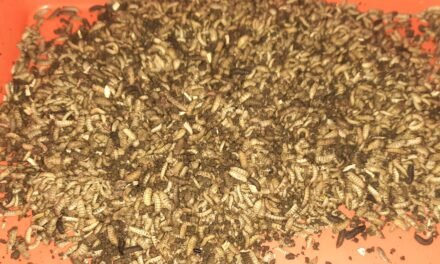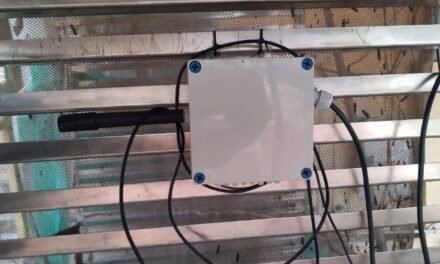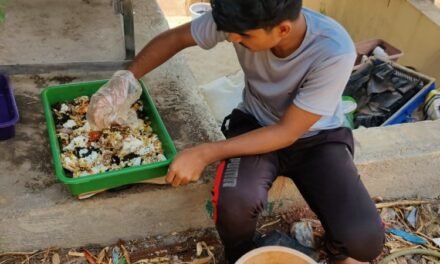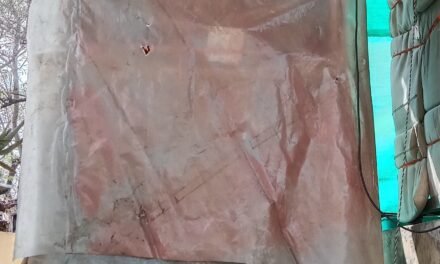On 3rd July, I was given a brief introduction to BSFL composting. Black soldier fly larvae (BSFL) are a type of insect that can be used to decompose organic waste. They are attracted to food waste and can eat a variety of materials, including food scraps, and agricultural waste. BSFL composting is a relatively new practise, but it has the potential to be a more sustainable and efficient way to manage organic waste.
I visited a residential area with Mr. Arun Dixit & Mr. Mahesh where the Vigyan Ashram has started a pilot project of BSFL composting for residential area. The project involves installing bins with 5 DOL (5 Day Old Larvae) in the community where residents can put their kitchen waste. The larvae would eat the waste and produce a nutrient-rich compost that could be used to fertilize gardens and lawns. The compost left will be sold and the pupae will be added to the breeding chamber back at Ashram.
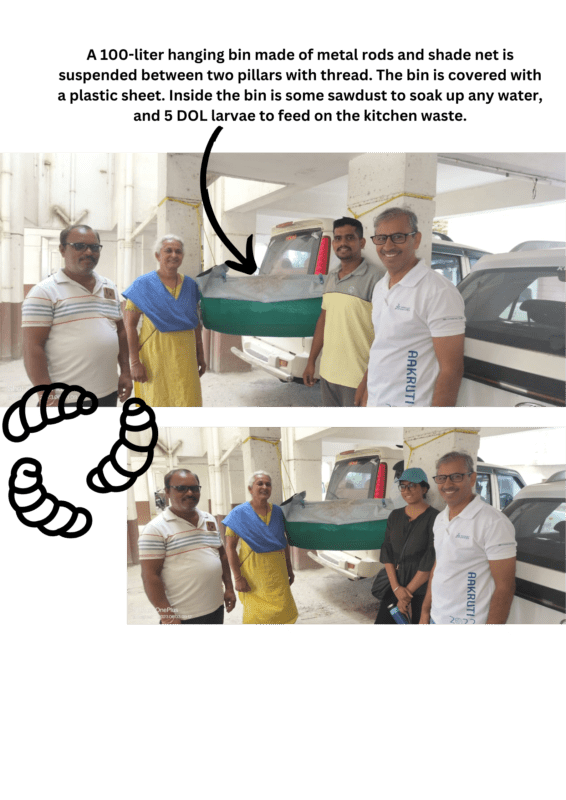
The project is still in its early stages, but it is showing promise. The residents were pleased with the convenience of the bins and the fact that they were able to reduce their environmental impact by composting their food waste. The Ashram is also pleased with the results of the project and is planning to expand it to other nearby communities.
BSFL composting is a promising practise that has the potential to reduce the amount of waste sent to landfills. It is a sustainable and efficient way to manage organic waste, and it is gaining popularity in communities around the world.
Here are some of the benefits of BSFL composting:
- It is a more sustainable way to manage organic waste than traditional composting methods.
- It is more efficient, as BSFL can eat a variety of materials and can decompose waste much faster than traditional composting methods (5 DOL can feed upon the waste till 15 days).
- It produces a nutrient-rich compost that can be used to fertilize farms, gardens and lawns.
- It is a low-cost and low-maintenance method of composting.
- Pupae can be used as poultry feed after the fly comes out. It can be a passive income for farmers.
After the visit, Mr. Mahesh showed me around the ashram’s BSFL system. Mr. Ranjit and Mr. Arun then told me about the part that I have to do in the project. I will be responsible for making design changes from the users’ and maintenance crew’s point of view. I will also need to read the existing literature and perform some experiments to make the system better. Finally, I will need to create a story line to pitch the system to the industry.
Here are the specific tasks that I will be working on:
- Design changes: I will need to make changes to the system to make it easier for users to use and for maintenance crews to maintain. This may involve changing the forms and materials, or the way that one part interacts with other the other parts of the system.
- Literature review: I will need to read the existing literature on BSFL systems to learn about the latest research and best practices. This will help me to identify areas where the Ashram’s system can be improved.
- Experiments: I will need to perform some experiments to test the effectiveness of my design changes. This may involve testing the system with users, monitoring the system’s performance, or comparing the system to other systems.
- Storyline: I will need to create a storyline to pitch the system to the industry. This will involve explaining the benefits of the system, the target market, and how did Ashram start the BSFL composting system, and how has it progressed over time?
I am excited to get started on this project and I am confident that I can make a significant contribution to the ashram’s BSFL system.

